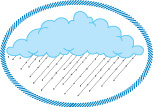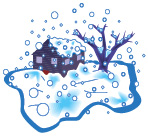

 Editor's Note: This is a sequel to an article that was in
the July/August
2007 issue by the same author.
Editor's Note: This is a sequel to an article that was in
the July/August
2007 issue by the same author.
It startled me a bit when I heard her publicly praying for it to not rain. She wasn't just asking for Sunday's picnic, but a rather general that's enough for awhile. I knew it was okay to pray for rain, but this praying against it surprised me.
I marvel at the process described by one of the shepherds of Tekoa as, "He ... who calls the waters of the sea and pours them out over the face of the land--the Lord is his name" (Amos 9:6b). But to many, rain is inconvenient. It dampens plans and travel, clothing, and hair. It is the ingredient that turns soil into mud. From most cultures, historical and present, people would be confused by this disdain for rain.
John Muir wrote of raindrops "singing with the stars the eternal song of creation." Those accompanying stars were not on stage but in the night sky. Likely he was referencing "the morning stars sang together" in the creation account of Job 38:7. Nothing relaxes me like the sound of a light sprinkle on a tin roof. Perhaps someday there will be a pile of hay under a tin roof, and I will dream.
 Out of the storehouse of God's
Word comes the declaration that rain
is a blessing from Him. The promised land was a land that drank the
rains from heaven and provided grain, wine, oil, and pasture. Drought
was a curse that could cause the people to perish (Deuteronomy
11:11-17). The song of Moses indicates that his teachings would be
like
showers on new grass (Deuteronomy 32:2). Only God sends rain because he
is the father of the rain (Jeremiah 14:22; Job 38:28).
We have this
witness to the living God, he gives us rain from heaven and the
consequential food and gladness (Acts 14:17).
Rain is the simplest
physical expression of the great giving of the God of heaven.
Out of the storehouse of God's
Word comes the declaration that rain
is a blessing from Him. The promised land was a land that drank the
rains from heaven and provided grain, wine, oil, and pasture. Drought
was a curse that could cause the people to perish (Deuteronomy
11:11-17). The song of Moses indicates that his teachings would be
like
showers on new grass (Deuteronomy 32:2). Only God sends rain because he
is the father of the rain (Jeremiah 14:22; Job 38:28).
We have this
witness to the living God, he gives us rain from heaven and the
consequential food and gladness (Acts 14:17).
Rain is the simplest
physical expression of the great giving of the God of heaven.
Yet Scripture does not give a one-sided story of man rejoicing at every sprinkle and thunder storm. A large gathering in the square was distressed by rain (Ezra 10:9), but a bonfire can ease the discomfort of a cold rain (Acts 28:2). A drippy rainy day can be annoying (Proverbs 27:15), and a storm can wipe out the crops (Proverbs 28:3). Outside the bounds of moderation, what is ordinarily a blessing can take on a negative connotation.
Man's comment about singing raindrops references a point after the storm when some were in plants, rivers, ice, and vapors. Then the raindrops sing out in transforming a dry land into animation. And it is God who turns the "desert into pools of water and the parched ground into springs" (Isaiah 41:18).
Before raindrops existed, it was God who created water. He fixed the laws of heaven and earth (Jeremiah 33:25). Consistent with those laws, two atoms of hydrogen and one of oxygen combine to form an amazing substance. The unusual angle at which these atoms combine results in surface tension, selective dissolving of substances, expanding as its temperature drops for the last few degrees before it freezes, and a much greater expansion when it turns to a solid. It takes on solid, liquid, and vapor forms in the ways entirely related to its unique structure and necessary to water the earth. In regard to these characteristics it is entirely unique, yet each of them required for an awesome substance necessary for a planet that can sustain life. Of course, it could not function as it does if it were not clear in the liquid state.
God added an indescribable touch of beauty to the scenario when he
created it so that vapor in the atmosphere can turn into snowflakes.
How could God  more vividly drop a note from the
heavens declaring his
presence than through the six-sided crystal of his snowflake? Besides,
white is a good functional color for snow on the earth's surface.
more vividly drop a note from the
heavens declaring his
presence than through the six-sided crystal of his snowflake? Besides,
white is a good functional color for snow on the earth's surface.
In Last Child in the Woods, Richard Louv relays this message from Potomac, Maryland, ninth-grader, Courtney Ivins: "As people grow older, nature's magnificence 'gets easier to overlook,'" she surmises. "Snow not only brings a chance to miss school, but it also provides a means for adventure. ... snowmen, igloos, and snowball fights.' But for many adults, she observes, 'snow is just another one of life's many hassles. The roads are slippery, traffic is increased, and sidewalks are ready to be shoveled.'"
As each of us grow older, we still need to listen. Raindrops are harmonizing with stars to effect the song of creation. And God adds one more touch as raindrops consort to turn sunlight into rainbows, and that spectrum of light accompanies their song.
Back to Contents Does God Exist?, MayJun08.